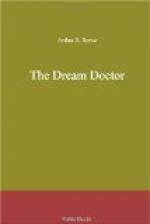“It is merely on technicalities of the law,” she replied with quiet fortitude, “that is, as nearly as I can make out from the language of the papers. Our lawyer is Salo Kahn, of the big firm of criminal lawyers, Smith, Kahn
“Conine,” mused Kennedy, half to himself. I could not tell whether he was thinking of what he repeated or of the little woman.
“Yes, the active principle of hemlock,” she went on. “That was what the experts discovered, they swore. In the pure state, I believe, it is more poisonous than anything except the cyanides. And it was absolutely scientific evidence. They repeated the tests in court. There was no doubt of it. But, oh, he did not do it. Some one else did it. He did not—he could not.”
Kennedy said nothing for a few minutes, but from his tone when he did speak it was evident that he was deeply touched.
“Since our marriage we lived with old Mr. Godwin in the historic Godwin House at East Point,” she resumed, as he renewed his questioning. “Sanford—that was my husband’s real last name until he came as a boy to work for Mr. Godwin in the office of the factory and was adopted by his employer—Sanford and I kept house for him.
“About a year ago he began to grow feeble and seldom went to the factory, which Sanford managed for him. One night Mr. Godwin was taken suddenly ill. I don’t know how long he had been ill before we heard him groaning, but he died almost before we could summon a doctor. There was really nothing suspicious about it, but there had always been a great deal of jealousy of my husband in the town and especially among the few distant relatives of Mr. Godwin. What must have started as an idle, gossipy rumour developed into a serious charge that my husband had hastened his old guardian’s death.
“The original will—the will, I call it—had been placed in the safe of the factory several years ago. But when the gossip in the town grew bitter, one day when we were out, some private detectives entered the house with a warrant—and they did actually find a will, another will about which we knew nothing, dated later than the first and hidden with some papers in the back of a closet, or sort of fire proof box, built into the wall of the library. The second will was identical with the first in language except that its terms were reversed and instead of being the residuary legatee, Sanford was given a comparatively small annuity, and the Elmores were made residuary legatees instead of annuitants.”
“And who are these Elmores?” asked Kennedy curiously.
“There are three, two grandnephews and a grandniece, Bradford, Lambert, and their sister Miriam.”
“And they live—”
“In East Point, also. Old Mr. Godwin was not very friendly with his sister, whose grandchildren they were. They were the only other heirs living, and although Sanford never had anything to do with it, I think they always imagined that he tried to prejudice the old man against them.”




